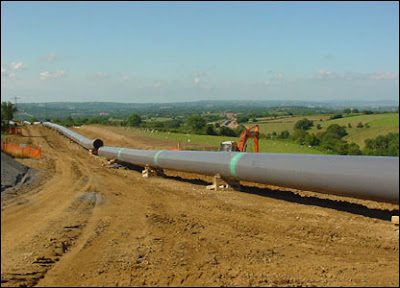What England Doesn't Want, Wales Gets.
I've become convinced that the UK government must a giant map somewhere, where power projects and communities are shifted around like so many pieces in a game of chess. Of course, for people who live nowhere near any of these projects, it's quite easy to be abstract and detached.
For people who have to live in the shadow of them for the rest of their lives, it can be a living hell.
Some communties seem quite happy to accept what's foisted on them. Others take a stand and fight back. And sometimes, they win. The fact that many of those communities happen to be in England, however, can create problems for poorer areas of the UK, where people may be happier to accept a few crumbs off the table.
Take Canvey Island, Essex, for example. The local council took a stand and fought off a proposal by Calor Gas, Centrica and Japan LNG to build a giant LNG terminal in the area. The scheme was earmarked to be operational by 2011. But in October of this year Calor Gas announced that they were withdrawing from the scheme, effectively killing the project.
This created a problem for the UK government. Canvey was provisionally earmarked to bring in 5.4 billion cubic metres of gas every year, a substantial proportion of the UK's overall demand. With the scheme dead, that supply will now have to come from somewhere else.
So goodbye Canvey, and hello Amlwch. And by sheer coincidence this scheme has been earmarked to be up and running by 2011 too! It all fits together so neatly...
Amlwch, however, is already a much bigger project, by Canatxx' own admission;
"When operating the plant is designed to regasify up to 3 bcf per day of LNG. This represents between 25% and 33% of UK daily total demand for gas. It will take 24 hours to discharge a tanker. At peak it is estimated that three tankers would be discharged a week."
With this plant up and running, by the UK government's target date of 2011, Amlwch, combined with Milford Haven in the south, will be importing approximately 50% of the UK's total gas requirement. Anybody who wants to take it out will know where to come.
But with a much lower population density, West and North Wales are much safer bets to site these controversial projects. People are desperate for the jobs, and planners and our representatives are happy to nod them through. So what price a couple of thousand Welsh lives, compared to the much more densely populated areas of the south east of England?
 A day after the European Commission agreed to look into the LNG project, a story of great significance to Welsh campaigners appeared on BBC Online.
A day after the European Commission agreed to look into the LNG project, a story of great significance to Welsh campaigners appeared on BBC Online.


